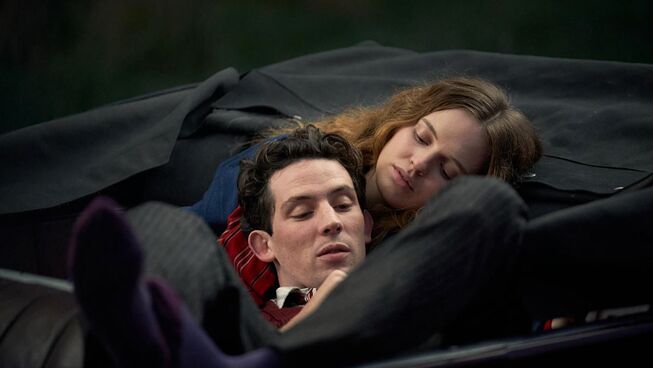
2.5 out 5 stars
Since its release, Graham Swift’s book has garnered celebration and consternation from critics. Especially for those who either embrace his deconstructionist fictional style or fail to enjoy it. Nonetheless, his novella has caused a bit of a stir as it provides a steamy beginning to an author’s career. As he looks at the post-war effects of The Great War on the wealthy elite of English society, Swift unpacks the life of an orphan who makes her way in the world after tragedies follow her.
All things centre on Jane Fairchild (Odessa Young), a housekeeper for the Nivens (Olivia Colman and Colin Firth) in 1924. On Mother’s Day, she is given the day off to enjoy the countryside. The young maid chooses to spend it with Paul Sheringham (Josh O'Connor) at his family’s country estate. Even though he is engaged to a family friend, the young law student enjoys an affair with this unassuming beauty who works in the wings of another wealthy landowner. These lovers enjoy the time alone despite all the families waiting for Paul’s arrival to celebrate his engagement.
His rebellion is to play against the tragedy that has plagued the community since the end of World War I. The promise to marry Emma Hobday (Emma D'Arcy) was only out of mourning the loss of his brother who had died on the battlefield and had meant to wed the brooding woman. With all of the parents waiting with Emma, there is a grievous tone in the festivities. All wonder what has kept the betrothed young man. Then tragedy strikes suddenly and causes more anguish for all involved. Still, it leads to Jane deciding to leave the Niven estate and become a writer.
Within the catastrophic background and the sordid love affair, something is lost in the interpretation of Swift’s book. Eva Husson (Girls of the Sun) does manage to capture the transformative nature of Jane Fairchild’s life story, but undermines the clarity through her disruptive timeline manipulation. Each scene becomes muddled by the use of jumps through time, making it challenging to piece together what is happening to the characters. This technique does manage to keep some of the critical twists hidden, which adds to the muted suspense of the unfolding drama. Yet, it all becomes discombobulating for the viewer and makes it difficult to invest in any of the cast.
Granted, Odessa Young (Shirley) was captivating in the central role and she does effectively travel through the decades well. Still, it is unclear why she must walk through the abandoned Sheringham mansion naked for the first two acts as she inspects their residence. An element that may be more of an issue with the original book than the film itself. Yet, none of it makes sense outside of the curiosity of how the other half lives; there is no apparent reason for her nude escapade. Beyond this element, the rest of the tale is somewhat laboured. While the whole film contains a melancholy that causes much of this ‘creative awakening’ narrative to be lost, especially since this did not seem to be the film's primary message. A point revealed in the end by the underutilised performance of Glenda Jackson. An Academy Award-winning actress who has not been seen in the cinema in 30 years is relegated to a forgettable footnote.
Mothering Sunday does provide a unique trajectory for writing talents and what inspires their careers. Also, unpacking the transitory world’s of young women by showing how beauty can come from tragedy. Yet, the disjointed storytelling and despondent tone will make this less accessible to most audiences.
Reel Dialogue: The secret beauty of tragedy
Later in the story, Jane is married to Donald (Sope Dirisu), who asks her what inspired her to become a writer. She lists off her birth and the gift of a typewriter, but then says the third thing is a secret. What is unknown to her husband was that her affair with Paul and the tragedies while working at the Niven home were catalysts for her writing career. Situations that were horrible to endure showed how something beautiful could be born out of difficulty.
Interestingly, this is the same thing that could be said about the heart of the Bible’s message. Many may ask how the cross that Jesus was crucified on could be something to celebrate. Still, begin to study what this wooden symbol represents. You can start to unearth the beauty behind the tragedy it means. How Jesus’ death was horrific, but his paying the price for the world's sins and rising again to defeat death turns this symbol into a thing of beauty. It also represents everlasting peace for all who believe.
True beauty comes out of tragedy.
‘For you were killed, and your blood has ransomed people for God from every tribe and language and people and nation. And you have caused them to become God’s kingdom and his priests. And they will reign on the earth.” - Revelation 5:9-10






